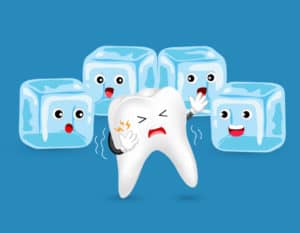
It’s an attention-getter when it does happen: sharp, sudden tooth pain when you take a hot or cold drink, bite into some ice cream, or even take a deep breath on a cold day. While occasional tooth pain from hot or cold may not be a problem, if it happens regularly you may have sensitive teeth. Sensitive teeth are not just a superficial issue, coming between you and really enjoying your morning coffee. As with many other forms of tooth pain, sensitive teeth can be a sign of other oral health problems and may indicate that you need to see your dentist. But why is that? What causes sensitive teeth, and what can you do about it?
Causes of Sensitivity
Your teeth are complex structures. The outer layers of enamel and dentin—the materials that make teeth white and shiny—cover up an interior filled with softer tissues and nerves that connect through the roots to the jaw. Any damage that weakens the layer between these nerve-filled tissues and the outside potentially lets heat and cold through and can thus make the tooth sensitive.
So what kind of problems cause sensitive teeth? Well, there are many but here are some of the more common ones:
- Enamel erosion occurs when the outer layer of protective enamel wears away due to repeated or intense exposure to hot, cold, sticky, or abrasive materials. This can happen gradually over time or all at once due to some sort of trauma, and common causes include age, poor diet, or gastric reflux disease. Eroded enamel exposes nerves to heat and cold, causing sensitivity.
- Cavities are the cause of so many dental woes, including sensitive teeth. Cavities are fundamentally fissures in the outer layers of the teeth, which expose the inner parts to all sorts of things including heat and cold. Indeed, sensitivity may be a sign a cavity is getting bigger. On a related note, just as cavities cause sensitive teeth, a lost or damaged filling intended to repair a cavity can lead to sensitivity as well.
- Receding gums are a common cause of sensitive teeth. Receding gums are typically the result of gum disease, or gingivitis, and can lead to long term problems on their own. As gums recede they expose the roots of the teeth, which are less sturdy than the crowns. As the roots are exposed the tooth may become more sensitive to heat or cold.
What to Do About Sensitive Teeth
While occasional tooth sensitivity may not be an issue, recurring or chronic sensitive teeth need to be treated by a dentist or other oral health professional. The required treatment will depend on your particular issues: a cavity may need to be filled or a filling replaced, gum disease may need treatment, a crown or inlay may be in order. Some extreme cases may require a root canal, but that’s not as serious as you may have been led to believe. For mild forms of sensitive teeth, your dentist may suggest a toothpaste designed for them, which will help reduce pain and strengthen enamel.
Your dentist will help you find the right solution for you, based on your condition and their experience. Fixing sensitive teeth is an important part of improving overall oral health, so don’t be afraid to ask your dentist about them.




